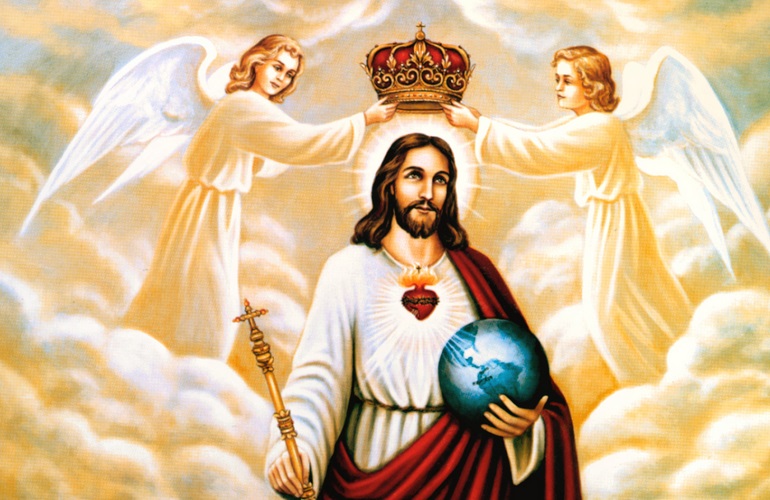A King of compassionate love
The world is not what it was before. It is going through critical times. It witnesses, in an unprecedented way, growing incidents of violence, economic polarisation, racism, poverty, systematic oppression, religious fundamentalism, cultural breakdown, environmental pollution and, added to this, there is the novel corona virus. There is nothing in our lifetime that has affected the world as radically as COVID-19.
Nov 19, 2021

Reflecting on our Sunday Readings with Fr Cyril Mannayagam
Christ the King
Readings: Daniel 7:13-14;
Revelation 1:5-8; Gospel:
John 18:33b-37
The world is not what it was before. It is going through critical times. It witnesses, in an unprecedented way, growing incidents of violence, economic polarisation, racism, poverty, systematic oppression, religious fundamentalism, cultural breakdown, environmental pollution and, added to this, there is the novel corona virus. There is nothing in our lifetime that has affected the world as radically as COVID-19.
These challenges have raised the existential question — what is the meaning and purpose of life? Are compassion and love still meaningful in the present scenario? Or have they lost all meaning in the present-day context?
There is an ever-growing degradation of human values. There is a constant fear that hinders the development of a self-actualised person in the language of psychology, spiritual person in the language of a religion and an informed person in the language of secular. As a result, we are growing into a civilisation of indifference and insensitivity.
All the problems in our society can, directly or indirectly, be traced back to a lack of reverence and recognition of the divine in human beings – in one’s own self and others. Lack of awareness of the divine, both immanent and transcendent, personal and impersonal, is the root cause of all the malaise in our world. A loss of sense of the sacred has given way to rampant individualism, excessive consumerism, and fundamentalism. In a world that is conflict-ridden, understanding the need for infusing God-awareness in human beings is crucial.
I have taken the theme “Are you the King of the Jews? And so, you are king?” Jesus answered “Yes, I am a King”, but He is a king of compassionate love. I also intend to explore some ways and means of addressing the challenges of the third millennium through the universal kingship of Jesus Christ. There is every hope that kingship of Jesus Christ can always bring about transformation in human beings.
Human beings are looking for fulfilment and happiness. Gaudium est spes appeals to all people to not be afraid of seeking to find the true meaning of life. We are lost in the uncertainties, worries and cares of the world. The document calls us to “go deeper” and thus to live a meaningful life. In the pursuit of happiness and fulfilment, humans pursue a horizontal path of wealth and power. But a deeper reflection on human reality indicates that horizontal paths can’t give us real meaning or a life of fulfilment. What gives real meaning is the vertical path, a transcendence towards God.
Being preoccupied with one’s own little self is the root cause of all problems. All sorts of problems, ups and downs, vagaries of life affect one’s life. Many are the paths available to human beings, “to go beyond” this little egoistic self. However, not all paths are valid and legitimate. Many follow the path of addictions — to alcohol, things, relationships, habits, positions, name and fame, etc — to forget their problems. However, it does not help one in the long run. Religions provide us with various paths to move beyond one’s own little self and towards transcendence. One such path is the kingship of Jesus Christ — a compassionate love. It was practised by towering personalities such as Jesus, the Buddha and, in recent times, Mother Teresa. Love comes from God and returns to God. Love can transform everything.
Firstly, the Kingship of Jesus Christ is compassion and love. Secondly, we are here to reflect God’s compassion and love. However, our selfish and egoistic self does not realise the true spirit of religion. As a result, we tend to grow in sectarianism and fundamentalism which divides person from person. Today, many want to be spiritual but not religious. Compassionate love can bridge the gap between spirituality and religiosity.
Finally, another name for God is compassionate love. If human beings are filled with compassion and love, they can’t remain with their selfish and egoistic self but will naturally transcend themselves. Having experienced compassion and love means to move towards transcendence, which becomes the summum bonum of our life. The best expression of transcendence is found in the words of St Augustine, “Our hearts are restless until they rest in you.” By nature, God is transcendent, and humans are transcending. Hence, our aim in life is to transcend to the Transcendent.
What Jesus did 2000 years ago, you and I are expected to do today. He said “love one another as I have loved you.” This commandment can be accomplished through only compassionate love. And what unites all of us is humanity. This humanity must be built on compassionate love. Science and technology were acting like semi-gods and goddesses, but the pandemic has made us understand their limitations and be humbled before nature.
Hence, the new world order must be built on love and compassion. “For the compassion of human beings is for their neighbour, but the compassion of the Lord Jesus is for every living thing.”
-- Fr Cyril Mannayagam is from the diocese of Malacca-Johore. He is currently a lecturer at St Peter’s College in Kuching







Total Comments:0